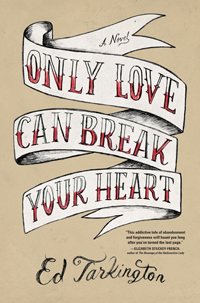Literature is filled with tales of unpublished writers, actual and imagined, who spend the dark nights scribbling away by lamplight while an indifferent world spins around them. Sometimes they’re lonely, misunderstood, the object of pity or ridicule. Often they’re long-dead before their genius is ever recognized. Holding up such authors as examples of the importance of being true to one’s own artistic vision tends not to be too inspiring to a young, struggling writer.
 Just every now and then, though, someone like Ed Tarkington comes along, someone whose story is so perfect it’s almost like a morality play, a fairy tale. Tarkington, an English teacher and wrestling coach at Nashville’s Montgomery Bell Academy, as well as a frequent contributor to Chapter 16, has logged untold hours at a lamplit desk of his own: each morning during the school year he rises at 3:30 a.m. and is at his desk by 4, where he writes fiction until it’s time to leave for work at 7. The other twenty-one hours of the day belong to his wife, two young daughters, and the boys at M.B.A. He has followed this routine for years, hoping but not at all sure—in an economic climate that’s hostile to all artists, but especially to the authors of literary fiction—that he would one day have something more to show for his indefatigable efforts than a manuscript box on the closet shelf.
Just every now and then, though, someone like Ed Tarkington comes along, someone whose story is so perfect it’s almost like a morality play, a fairy tale. Tarkington, an English teacher and wrestling coach at Nashville’s Montgomery Bell Academy, as well as a frequent contributor to Chapter 16, has logged untold hours at a lamplit desk of his own: each morning during the school year he rises at 3:30 a.m. and is at his desk by 4, where he writes fiction until it’s time to leave for work at 7. The other twenty-one hours of the day belong to his wife, two young daughters, and the boys at M.B.A. He has followed this routine for years, hoping but not at all sure—in an economic climate that’s hostile to all artists, but especially to the authors of literary fiction—that he would one day have something more to show for his indefatigable efforts than a manuscript box on the closet shelf.
Then, in late May, two weeks before his fortieth birthday, Tarkington got the email he’d been waiting for so long: his agent, Gail Hochman, was writing to say that an editor at Algonquin Books (an imprint of Workman) wanted to talk with him. Within hours senior editor Andra Miller had offered him a publishing contract for his first novel, Only Love Can Break Your Heart. He recently returned from New York, where he met with Miller and learned that the book’s tentative release date is spring 2015. Today Tarkington—who holds a B.A. from Furman University, an M.A. from the University of Virginia, and a Ph.D. from the Graduate Creative Writing Program at Florida State University—talks with Chapter 16 about what it means to have a literary dream come true.
Chapter 16: What are you allowed to tell us about the plot and characters of Only Love Can Break Your Heart?
Ed Tarkington: I’m not really supposed to say much. Lately, my canned response has been to say that it’s sort of a mash-up of Cain and Abel, the Prodigal Son, The Graduate, and “A Rose for Emily,” set in the small-town Upper South, with a soundtrack by Neil Young and Joni Mitchell.
Chapter 16: How would you characterize the tone or style of the novel?
Tarkington: Well, when I started writing, I was teaching Great Expectations, and I fell back in love with that book, which I adored as a boy. (I think my mom showed us the David Lean movie before I turned ten, and then I read it in high school myself.) I wanted to write something in a similar voice, with a spooky Gothic undertone and a haunted house.
Chapter 16: If you had to compare this novel to the work of any contemporary novelists, what authors come to mind?
 Tarkington: In general I wanted to get back to a more straightforward, traditional kind of storytelling—the kind of stuff I was weaned on, like Pat Conroy and John Irving (who, for all of his thematic and topical daring, has always proudly identified with the traditional Victorian novel). My book is not especially long, but it tries to adhere to the virtues of those kinds of books, where a lot of stuff happens and you really care about the characters and get drawn into their lives. My editor has told me that the people at Algonquin feel it sort of hearkens back to the kind of books the house became famous for—Kaye Gibbons, Clyde Edgerton, Jill McCorkle, etc. They’ve also found some shades of Walker Percy, which is extremely flattering to hear, as he is one of my great heroes.
Tarkington: In general I wanted to get back to a more straightforward, traditional kind of storytelling—the kind of stuff I was weaned on, like Pat Conroy and John Irving (who, for all of his thematic and topical daring, has always proudly identified with the traditional Victorian novel). My book is not especially long, but it tries to adhere to the virtues of those kinds of books, where a lot of stuff happens and you really care about the characters and get drawn into their lives. My editor has told me that the people at Algonquin feel it sort of hearkens back to the kind of books the house became famous for—Kaye Gibbons, Clyde Edgerton, Jill McCorkle, etc. They’ve also found some shades of Walker Percy, which is extremely flattering to hear, as he is one of my great heroes.
Chapter 16: How does it feel to sell a book at a time when so many people believe that publishing is dying?
Tarkington: Of course it feels fantastic, and a bit surreal, and very humbling. I do not believe that publishing is dying—not in the least—but the ground is certainly shifting pretty wildly beneath our feet, and there is no question that the traditional publishing world has become much, much harder to crack for new writers. I feel doubly fortunate to have landed at Algonquin, a house famous for taking care of its authors and prioritizing literary fiction.
Chapter 16: To an author whose book won’t see print for more than a year, it might seem a little surreal to be asked this question, but while the struggle is still fresh in your own mind, do you have any advice for aspiring writers?
Tarkington: Oh, I’m hardly in any position to be handing out sage advice. Everyone has to find her own way. I will, however, pass on the most useful advice I ever read, in an interview with a very successful novelist I deeply admire: “Give it up. You’re probably not good enough, and even if you are, it probably won’t matter. Spare yourself the frustration and the disappointment.” Boy, when I read that, it made me so mad I started working harder and with greater discipline and determination than I’d previously thought myself capable of.
Chapter 16: Has this good news changed anything about your life, your self-image, or your writing practice?
Tarkington: It changes everything, and it changes nothing. The validation is very gratifying. Certainly, I approach my work with a greater measure of confidence. But as a friend and former teacher once told me, “Your kids don’t care about your publishing career; they just want their daddy.”
[This interview originally appeared on July 9, 2013. It has been updated to include new event information.]

Margaret Renkl, the editor of Chapter 16, has published widely in both literary and mainstream magazines. Her work has appeared in or is forthcoming from The Southern Review, Shenandoah, Black Warrior Review, The New York Times, Good Housekeeping, and Women’s Health, among others. She lives in Nashville.
Tagged: Fiction





